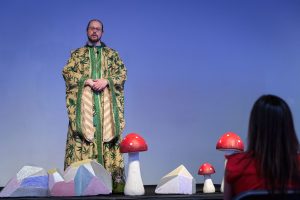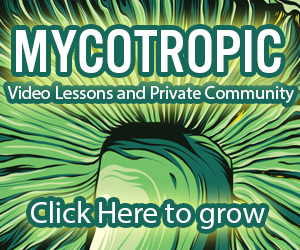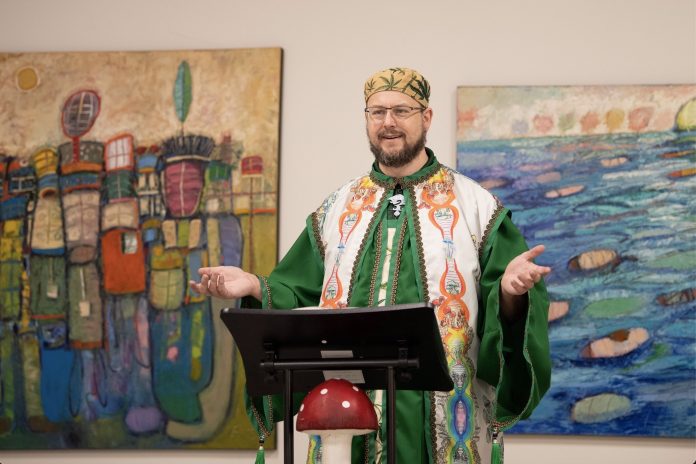The Magic Mushroom Pastor vs. the City of Oakland: Is Psychedelic Decriminalization Winning?
The battle over who has the right to consume psychedelics rages on
By Robert Johnson
If there were awards for peak Oakland headlines, “Oakland mushroom church sues police department over raid” might very well win.
On August 13, 2020,the Oakland Police Department broke down the doors of the Zide Door Church of Entheogenic Plants. The raid made national headlines for its seeming absurdity, but the stakes in this legal battle remain quite serious. Zide Door and its founder, Dave Hodges, upped the ante by filing suit against the police and city of Oakland for violating their congregation’s constitutional right to practice religious sacraments in peace.
The legal battle over who has the right to consume psychedelics, what constitutes religious freedom and what decriminalization really means for the burgeoning psychedelic marketplace has only just begun.

Dave Hodges: The Mushroom Pastor With a Megachurch
Zide Door and The Church of Ambrosia are led by pastor Dave Hodges. Like so many mushroom champions, Hodges has a history as a cannabis activist. When he founded Zide Door in 2019, it was originally a cannabis church, but Hodges started incorporating psilocybin into the congregation’s sacraments after his own transformational experiences with magic mushrooms. “They’ve shown me things that have helped me understand my path further, understand what God is and what I’m here to do on this planet,” he has said. At the time of the 2020 raid, the church was said to have more than 20,000 members. By 2023, Hodges claimed his congregation had gained 70,000 new members. In 2024, Zide Door’s membership has swelled to more than 100,000, making it the biggest psychedelic church on earth.
Contrary to critics’ assumptions, Zide Door isn’t some rave-adjacent free-for-all: Only church members are able to acquire mushrooms or cannabis, and there are requirements for joining. You must show ID proving you are at least 21, complete an application affirming that entheogenic plants are part of your religious practice, and pay a membership fee of $5 a month. Once approved, members typically receive access to a menu of psychedelic mushrooms, as well as cannabis strains priced far more affordably than those at the dispensary. The church offers consumption and safety guides on their website, and it’s got more than 300 Google reviews, with a 4.6 star average.
Police raided Zide Door in 2020 on the grounds that it was operating as an illegal dispensary. During that raid, Oakland police took $200,000 worth of cannabis and mushroom products, plus $4,500 in cash. (Formal charges in connection to the raid have never been filed.)

Hodges posted video to his Instagram of the 2020 raid that shows numerous cops toting what look like semi-automatic weapons as they storm his humble storefront, with a caption demanding “Is this really the best use of resources when we are in the middle of a crime wave in Oakland? How many assaults, carjackings, and murders happened while the police were wasting their time?” The raid’s level of personnel and force came across to many as excessive. Even conservative Conn Carroll at the equally conservative Washington Examiner had to ask: “Why would the city go after a magic mushroom pastor?”
The public outcry over arresting nonviolent people with plants may put additional pressure on law enforcement to de-prioritize arrests for magic mushroom possession. Certainly it helped in the 1990s, when medical marijuana advocates like Dennis Peron were thrown in jail for providing cannabis to terminally ill AIDS patients. But for now, psilocybin possession remains a felony offense with serious criminal penalties, including prison time.
Unbowed and unbroken, Hodges opened a new house of worship in San Francisco in 2023.
How Religion, Ceremony & Psychedelics Intersect with the Law
As he told SFGate, Hodges sees Zide Door as no different from the ayahuasca and peyote churches that are permitted to operate under the Religious Freedom Act—and when Hodges describes psychedelics as the oldest religion on earth, he’s not wrong. Psychedelic substances have been part of human ceremony and ritual since long before the arrival of monotheistic faiths and organized religion.
There are numerous psychedelic churches in America already, in part because our national historic deference to and protection of faith-based enterprises provides some legal cover (as Reuters points out, American churches aren’t required to obtain a liquor license to serve wine). But Hodges’ faith is not a tongue-in-cheek attempted end run around federal drug laws. “For me, it’s defending access to God,” Hodges told SFGATE.
What Hodges and his congregation see as plant-based worship, the laws of the state of California and the federal government categorize as serious felonies with criminal penalties that can entail decades in prison. Despite the Oakland City Council’s 2019 decriminalization resolution, which declared that “the investigation and arrest of individuals involved with the adult use of entheogenic plants on the federal schedule 1 list [should] be amongst the lowest priority for the city of Oakland,” the sale and consumption of magic mushrooms remains illegal.

It’s still unclear whether decriminalization will actually reduce prosecutions of citizens who distribute and consume entheogenic plants and fungi. Decriminalization statutes have passed in American cities from Oakland and San Francisco to Seattle, Detroit and Washington, D.C.. and psychedelic advocates cheered when the San Francisco Board of Supervisors passed a similar resolution decriminalizing entheogenic substances in 2022. But these resolutions don’t actually bind law enforcement or change the laws. Though decriminalization statutes typically urge police to make psychedelics the lowest priority for enforcement measures, the jury is out as to whether cops will abide by these recommendations. Indeed, just months after San Francisco’s decriminalization resolution was passed, a shop owner in the Haight was arrested for allegedly selling mushrooms
Hodges insists that “Decriminalization is nowhere near enough. We need to actually remove criminal penalties.” These resolutions indicate welcome shifts in the culture, and they make for great headlines, but they don’t eliminate criminal penalties. Only state legislators can do that. Pro-entheogenic resolutions like San Francisco’s recommend that “the investigation and arrest of individuals involved with the adult use of entheogenic plants…be amongst the lowest priority for the City and County of San Francisco.” But as Hodges points out, “There’s no definition or standard of priority. The police department’s job is to enforce state laws—how much can you punish someone for doing their job?”
For now, magic mushroom product vendors and small businesses are operating quietly, but not invisibly. Vendors have already popped up in Canada and on the West Coast, assuming that discreet consumption and sale of psychedelics won’t draw police attention, especially in municipalities with decriminalization statues on the books—but it’s uncertain whether district attorneys, sheriffs and police departments agree. Hodges seems resigned to this ambiguous future, acknowledging “If you want to do what I do, you have to be prepared to go to federal prison.”
Hodges Looks Victorious in his Fight with Oakland Officials—For Now
In July 2023, The Oaklandside reported that, after Oakland city officials informed him he could apply for a conditional use permit for Zide Door to become a church through the Bureau of Planning, Hodges dropped his lawsuit. But it’s not over til it’s over: Hodges told The Oaklandside that if the permit isn’t issued, “We will have reason to go right back to court.”
Hodges remains staunch in his mission to spread the mushroom gospel, no matter what happens. The police raid, the resultant lawsuit and the media firestorm seems to have provided a massive boost to the church’s profile, turbo-charging its profile and membership. “I could have never imagined that the raid would lead to us being the largest psychedelic church in the world,” Hodges told The Oaklandside. Perhaps law enforcement should take note.
Robert Johnson is a cannabis and hemp industry veteran, psychedelic advocate and founder of premium mushroom product company Mycroboost.





